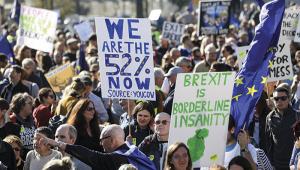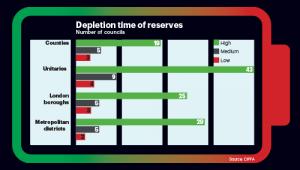Windrush compensation pot agreed
The value of funding to compensate members of the Windrush generation, who wrongly lost jobs, benefits, homes and access to healthcare in the UK after being erroneously targeted by immigration officials, will be £200m. Home secretary Sajid Javid announced the funds after a Public Accounts Committee report found that his department was “shirking” its responsibility.
‘No-deal’ Brexit money already being spent
The amount allocated to Scotland through the Barnett formula for ‘no-deal’ Brexit planning is £92m, according to the Scottish Government. Michael Russell, cabinet secretary for government business and constitutional relations, says the money is already being used across the public sector.
Homelessness act not properly funded
A survey by think-tank the New Local Government Network reveals that up to 67% of councils feel they lack the funding to meet new duties under the Homelessness Reduction Act. Urban councils in particular are feeling the strain, with 86% suggesting the £72.7m government funding is not enough.
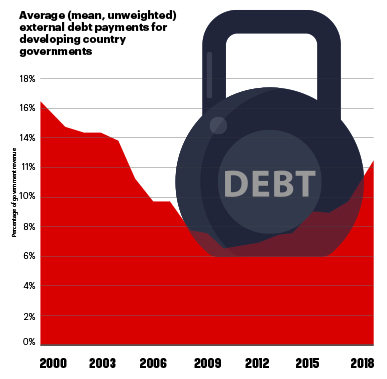 Up 85%: foreign debt payments among poor countries
Up 85%: foreign debt payments among poor countries
Urgent action is being demanded to tackle a growing debt crisis among poor countries, where foreign debt payments soared by 85% between 2010 and 2018, according to the Jubilee Debt Campaign. Its analysis shows that average government external debt payments across the 124 developing countries for which data is available increased from 6.6% of government revenue in 2010 to 12.2% of government revenue in 2018.
This is the highest level since 2004, when such payments were 13.8% of government revenue. The rapid increase comes after a lending boom, driven by low global interest rates. External loans to developing country governments more than doubled from $191bn per year in 2008 to $424bn in 2017.
Poor sanitation still threatens billions of lives
The lack of basic water facilities in one in four medical centres poses grave risks to the health of more than 2 billion people globally, according to a new report by the World Health Organization and the UN children’s fund, Unicef.
This says that one in five healthcare facilities globally has no toilet or latrine – a problem that affects at least 1.5 billion people and places mothers and newborn babies at particular risk. The WASH in Health Care Facilities report appeals to countries to do more to prevent the transmission of treatable infections that can be deadly if not washed or flushed away.
- One in five births globally take place in the world’s 47 poorest nations
- Every year, 17 million women in these countries give birth in health centres with inadequate water, sanitation and hygiene supplies
- One in 10 hospitals globally lack a toilet, but this rises to one in five for smaller health facilities
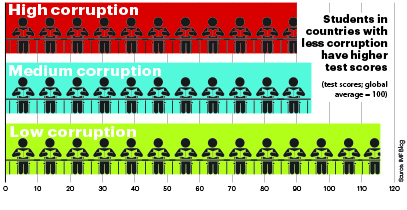 Corruption damaging to education
Corruption damaging to education
The International Monetary Fund’s latest Fiscal Monitor analyses more than 180 countries and finds that more corrupt countries collect fewer taxes. As a result, corruption distorts government spending priorities: among low-income countries, the share of the budget dedicated to education and health is one-third lower in more corrupt countries.
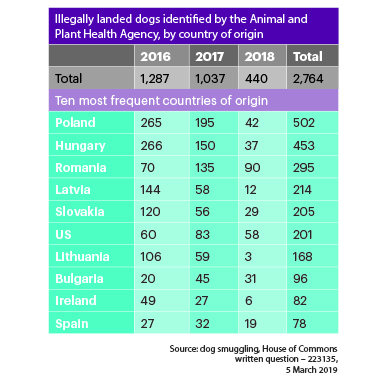 Puppy smugglers busted
Puppy smugglers busted
Smugglers exploiting the Passports for Pets scheme to bring puppies of desirable breeds into the UK from the EU are being cracked down on. Following consultation last year, the government plans to ban the commercial third-party sale of puppies and kittens in England, meaning that only licensed breeders and pet shops that follow rigorous welfare standards will be authorised to sell young pets.
Animal welfare groups have been lobbying to stop under-age animals bred in poor conditions being brought into the UK for sale. A key problem, however, is lack of data: there are no reliable figures on demand for puppies, or even any official estimates of the number of dogs in the country.
However, in October 2017, the government revealed that 600 puppies had been seized at borders since the Animal and Plant Health Agency began an initiative in December 2015 to identify and seize smuggled dogs and puppies. In March 2019, Defra published the number of animals ‘illegally landed’ (not meeting Rabies Order requirements) between 2016 and 2018.
Child poverty on the rise
In the UK, 30% of children – 4.1 million – are living on less than 60% of the current median income, according to figures released by the Department for Work and Pensions.
The households below average income data also revealed that children living in absolute poverty increased by 200,000 in 2017-18 from 3.5 million in 2016-17.
The risk of poverty for children in families with three or more children jumped from 32% in 2012 to 43% in 2017-18 after housing costs, the government figures revealed.
The Child Poverty Action Group said in March that its own research shows that the number of poor children in working families has risen from 67% to 70% in the past year. It says 53% of poor children are aged under five (up from 51%) – more than 2 million children.




